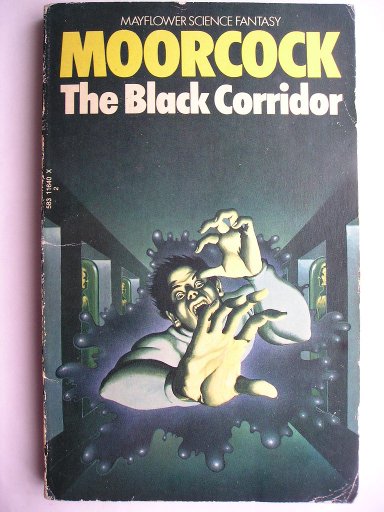
The novel “The Black Corridor” by Michael Moorcock was published for the first time in 1969.
At the end of the 20th century, the world situation is becoming more and more chaotic. Even in the most advanced nations the society is disintegrating and in England a fascist faction rises to power, leading to an increasing xenophobia. Ryan is a businessman who tries to go on as long as he can but it comes time to make a radical choice to save his family.
Together with a group of friends and relatives, he uses the resources they have available to steal a spaceship and leave for the planet Munich 15040, which orbit Barnard’s Star. The planet is considered suitable for colonization but it’s six light-years away so the journey is really long. While the others are put into hibernation, Ryan watches over the spaceship traveling towards the destination but solitude and the memories of the last disastrous years on Earth make it difficult to maintain contact with reality.
The writer Hilary Bailey, then married to Michael Moorcock, had started writing a novel about the future society collapse but she didn’t go on. At that point, her husband decided to use his wife’s ideas for his novel, which became “The Black Corridor”. The scenes set on Earth are the rewriting of Hilary Bailey’s story and Michael Moorcock added the part set in the starship.
The result is a novel that tells in parallel the story of Ryan to the starship he decided to call “Hope Dempsey”, and a series of flashbacks that show the gradual collapse of the British society in the previous years. Michael Moorcock has built the story in such a way that in the end it’s a psychological novel more than a catastrophic one.
The story is told following Ryan’s point of view, a choice partly forced because he’s the only one left awake on the starship to oversee its proper functioning while his relatives and friends who fled with him from Earth are in hibernation. This situation becomes heavier and heavier for Ryan, who gradually loses contact with reality, but what’s real?
Ryan story on the starship becomes more and more surreal but the flashbacks aren’t necessarily more reliable. The story of the rise to power of a fascist faction is told in a rather rough way, giving the impression that England has been reduced to a country of crazy paranoids. At some point, even the Welsh are considered foreigners to watch with suspicion, even worse the Irish.
Even in certain scenes with friends and family there are situations bordering on the absurd. They, too, show a society in disarray where people isolating themselves more and more and trying to have contact with only a small group of trusted people. This isn’t always enough because there are strong tensions within the family and among those who are supposed to be friends.
However, the doubts concerning the reliability of the story especially concern the scenes on the starship. There are several scenes with the computer printouts, which are in the style of old printers that could print plain text only, formatted with asterisks. In several cases there are sequences of printed texts that form patterns that reflect Ryan’s state of mind, surely not what a computer would produce.
The result is that reading “The Black Corridor” the doubts about what is really happening increase page after page. The various scenes add ambiguity after ambiguity and Michael Moorcock deliberately inserts various details that lead to different conclusions. At the end of the novel, each reader can choose one of the alternative explanations or re-read it to re-examine the various elements.
In any case, what is certain is that there is no happy ending because “The Black Corridor” is a novel with really dark tones. If initially there’s hope about the journey to the planet Munich 15040, it soon becomes clear that things are bad and will only get worse. Ryan’s state of mind, already compromised at the beginning of the story, degenerates into psychotic episodes.
“The Black Corridor” is a dig in Ryan’s psyche so he’s the only character really developed. In the scenes on Earth the pace is fast though there’s not much action. The novel is fairly short even by the Bitish standards of the time so even in the scenes on the starship the pace never slows down very much.
In my opinion, “The Black Corridor” is a good novel but because of the way Michael Moorcock developed it you probably need to appreciate that kind of stories and its themes to like it, better if you have no tendencies to depression.


Permalink